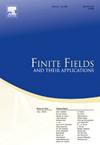关于无和函数
IF 1.2
3区 数学
Q1 MATHEMATICS
引用次数: 0
摘要
如果一个从F2n到F2n的函数在F2n的每一个k维的f2仿射子空间上的值的和是非零的,那么这个函数就是无k阶和的。这个概念是最近由C. Carlet引入的,作为APN函数的推广。这个新主题的中心是一个关于乘法反函数finv(x)=x−1(其中0−1定义为0)的和自由度的猜想。已知finv是二阶(即(n−2)阶)自由和当且仅当n为奇数,并且推测当3≤k≤n−3时,finv绝不是第k阶自由和。对于偶数n,该猜想已被证实,但对于奇数n,该猜想仍然是开放的。在本文中,我们证明了该猜想在下列条件下成立:(1)n=13;(2) 3 | n;(3) 5 | n;(4) n的最小素数因子l满足(l−1)(l+2)≤(n+1)/2。我们还确定了二元乘法反函数finv在自由和情况下的“正确”q-ary泛化。这种q-ary泛化不仅保留了其二进制版本的大多数结果,而且还展示了一些在二进制情况下没有观察到的特殊现象。本文章由计算机程序翻译,如有差异,请以英文原文为准。
On sum-free functions
A function from to is said to be kth order sum-free if the sum of its values over each k-dimensional -affine subspace of is nonzero. This notion was recently introduced by C. Carlet as, among other things, a generalization of APN functions. At the center of this new topic is a conjecture about the sum-freedom of the multiplicative inverse function (with defined to be 0). It is known that is 2nd order (equivalently, th order) sum-free if and only if n is odd, and it is conjectured that for , is never kth order sum-free. The conjecture has been confirmed for even n but remains open for odd n. In the present paper, we show that the conjecture holds under each of the following conditions: (1) ; (2) ; (3) ; (4) the smallest prime divisor l of n satisfies . We also determine the “right” q-ary generalization of the binary multiplicative inverse function in the context of sum-freedom. This q-ary generalization not only maintains most results for its binary version, but also exhibits some extraordinary phenomena that are not observed in the binary case.
求助全文
通过发布文献求助,成功后即可免费获取论文全文。
去求助
来源期刊
CiteScore
2.00
自引率
20.00%
发文量
133
审稿时长
6-12 weeks
期刊介绍:
Finite Fields and Their Applications is a peer-reviewed technical journal publishing papers in finite field theory as well as in applications of finite fields. As a result of applications in a wide variety of areas, finite fields are increasingly important in several areas of mathematics, including linear and abstract algebra, number theory and algebraic geometry, as well as in computer science, statistics, information theory, and engineering.
For cohesion, and because so many applications rely on various theoretical properties of finite fields, it is essential that there be a core of high-quality papers on theoretical aspects. In addition, since much of the vitality of the area comes from computational problems, the journal publishes papers on computational aspects of finite fields as well as on algorithms and complexity of finite field-related methods.
The journal also publishes papers in various applications including, but not limited to, algebraic coding theory, cryptology, combinatorial design theory, pseudorandom number generation, and linear recurring sequences. There are other areas of application to be included, but the important point is that finite fields play a nontrivial role in the theory, application, or algorithm.

 求助内容:
求助内容: 应助结果提醒方式:
应助结果提醒方式:


